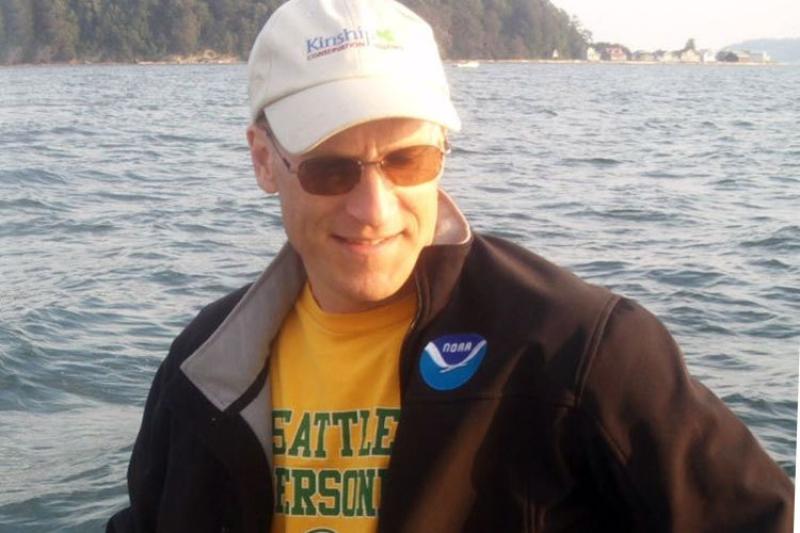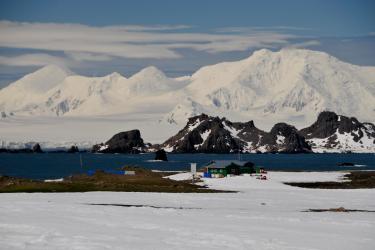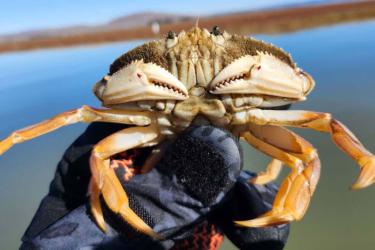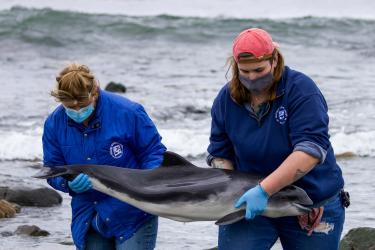This is National Ocean Month and a good time to enjoy the sustainably harvested seafood the ocean provides. Aquaculture—also known as fish and shellfish farming—increases that harvest. NOAA Fisheries has long supported aquaculture, which generates hundreds of millions of dollars in revenue and thousands of jobs on the West Coast. A new Executive Order, Promoting American Seafood Competitiveness and Economic Growth, is another step forward. Our West Coast Aquaculture Coordinators help foster opportunities to supplement the West Coast’s wild catch with farm-raised fish and shellfish—and seaweed, too.
Here is a chance to meet them:
- Dan Tonnes, Aquaculture Coordinator for Oregon and Washington
- Diane Windham, Aquaculture Coordinator for California
Meet Dan Tonnes, Regional Aquaculture Coordinator in the Northwest
Shellfish initiatives and pilot projects build understanding of new methods and technology.
Dan Tonnes joined the aquaculture program in late 2019 as the Oregon/Washington Aquaculture Coordinator. Dan has worked as a biologist for the West Coast Region since 1999 in the Lacey, Portland, and Seattle offices. In that role, he worked on the development of long-term Habitat Conservation Plans for pacific salmon and rockfish in Puget Sound and the Georgia Basin. He also provided Endangered Species Act programmatic consultations related to watershed restoration, agriculture, oil spill response, integrated pest management, and forestry actions. Programmatic consultations evaluate the impacts of a series of projects on endangered species at once and often allow for more efficient review.
In the aquaculture realm, Dan has worked on kelp research and conservation issues for the past several years. He worked in partnership with the Northwest Straits Commission, the Washington Department of Natural Resources, and the Puget Sound Restoration Fund. He worked with the previous Aquaculture Coordinator to support the development of a new kelp lab at the Northwest Fisheries Science Center’s Manchester Research Station. The lab supports kelp seed propagation for farming and research. He has also worked with Sea Grant on the recent Seaweed Farming Intensive training.
“This position provides a great opportunity to work with Tribal and non-tribal commercial interests to further the unique role that aquaculture can provide to improve food security, and also to augment restoration efforts of native kelp and shellfish in the Northwest,” he said.
Dan started his career operating fishing boats in Puget Sound and Alaska, and passenger ferries and oil spill response vessels in Washington. He received a bachelor’s degree in Environmental Planning from Seattle Pacific University and a Master's in Marine Affairs from the University of Washington. He was selected as a Kinship Conservation Fellow, where he studied market-based solutions to environmental challenges. At the University of Washington, Dan studied intertidal environments in the North Puget Sound, including how environmental conditions affect invertebrate abundance and diversity. He has also received the NOAA’s Administrator Award and Gears of Government Award for his efforts to support the agency’s Diversity and Inclusion goals.
“With strong partnerships with the University of Washington, and other institutions and agencies, we’ve been able to support student participation in unique research and projects that would have otherwise not been exposed to marine sciences,” he said. “I hope to continue to help provide these experiences in the aquaculture setting.”
Moving forward, Dan is interested in helping develop pilot projects to help build understanding and social acceptance of different aquaculture techniques. Examples include multi-trophic aquaculture and land-based operations that could be expanded in the Northwest. Dan will also continue to provide agency support for implementation of the National and Washington State Shellfish Initiatives and for finalization of the Oregon Shellfish Initiative.
Meet Diane Windham, Regional Aquaculture Coordinator in California
Diane Windham’s first federal job was as a seasonal ranger on San Miguel Island, the northernmost of the Channel Islands off southern California. Today she is NOAA Fisheries’ West Coast Regional Aquaculture Coordinator for California. A graduate of the University of California Santa Barbara, Diane’s passion is coastal and marine resource management. That’s where she applies her expertise translating science for management and policy-makers. Diane has built strong partnerships between NOAA Fisheries regulatory and science staff, non-government organizations, and the aquaculture industry throughout California and other states.
Before joining NOAA Fisheries, she conducted marine mammal research and surveys in southern and central California. She has spent most of her 34-year federal career in NOAA Fisheries. She has served in roles ranging from salmon recovery coordinator to coordinating marine mammal strandings in northern California. Diane now spends her time working on several proposed offshore aquaculture projects off southern California, educating potential applicants about the regulatory process and requirements, so they can prepare adequate permit application materials in advance of the formal permitting process. This also entails collaborating with NOAA’s National Ocean Service and other federal and state regulatory agencies to identify potential farm sites that avoid and minimize conflicts, as well as sensitive habitat and species, as well as internal coordination with her Protected Species colleagues in the West Coast Region. In addition, she reviews National Sea Grant aquaculture proposals and advises applicants on various aquaculture grant proposals.
Diane splits her time between the West Coast Region’s Long Beach office and the Southwest Fisheries Science Center in La Jolla, California. In her spare time, Diane enjoys quality time with her family traveling, kayaking, hiking, swimming and snorkeling, boating, gardening, and babysitting her grand-dogs.
We asked Diane about her position and career.
What do you like most about your job?
It's always challenging and I'm continually learning new things. After 12 years as a Regional Aquaculture Coordinator, I am still excited to work on marine aquaculture. I still feel passionately that my job contributes to the greater good. I enjoy the team-work and collaboration, and I value working across multiple disciplines.
How much change or progress in aquaculture have you seen over the course of your career?
I started as Aquaculture Coordinator 12 years ago when the role was brand new. I have watched the Aquaculture Program grow over the years. My position has grown too. Aquaculture can be controversial and clouded by misinformation. But I have watched the industry evolve, and watched growers bring integrity and passion to their work. I have witnessed first-hand the joy of teaching someone how to shuck an oyster.
The U.S. aquaculture industry constantly changes and improves, adopting operational efficiencies and protecting the marine environment. The research community and industry are collaborating on alternative feeds for farmed fish that are plant- or algae-based. Aquaculture practitioners, whether raising shellfish, seaweed, or farming fish, care deeply about the marine environment. You need healthy marine ecosystems to grow healthy seafood! It is exciting to see the growth of marine aquaculture breathe renewed life into coastal communities. I feel fortunate to be working on aquaculture at a time when great advancements in science and technology can help improve public understanding of and support for marine aquaculture.
Why are partnerships so important in your role?
Partnering with our federal, state, and local agencies, as well as stakeholders and the general public, is essential in developing marine aquaculture. Partnering fosters collaboration and creative problem-solving. It creates solutions that inform our respective regulatory decisions, increases understanding of the marine ecosystem, and shapes development of the aquaculture industry. A team environment enhances problem-solving and yields effective solutions. I have been fortunate to be part of working groups that tackled concerns facing the industry in a collaborative, solution-oriented manner. It is rewarding to be part of the growth of a healthy domestic seafood supply.
What do you consider your biggest accomplishment?
I take great pride in my career with NOAA Fisheries, and especially as an Aquaculture Coordinator. I was proud to be part of the NOAA Fisheries Aquaculture Team that received a Department of Commerce Silver Medal Award in 2013 for "developing new Department and NOAA Aquaculture Policies both to advance the U.S. aquaculture industry and protect coastal and marine environments." To be part of this team and receive such recognition was an incredible honor and continues to influence the work I do today.
What gave you the most satisfaction?
I convened a two-day workshop in June 2019 at the Southwest Fisheries Science Center, titled "Southern California Offshore Aquaculture Gear and Protected Species Interactions.” The workshop covered offshore aquaculture gear types and their function, and reviewed protected species presence and behaviors in southern California. The information-sharing revealed data gaps and how we might assess the risk of protected species such as sea turtles or marine mammals getting tangled in gear or otherwise affected. The workshop was well attended and reflected the true spirit of collaboration and creative problem-solving, with several "next steps" to continue the dialogue. One of the major next steps is to convene a Southern California Offshore Aquaculture Interagency Working Group in 2020.







